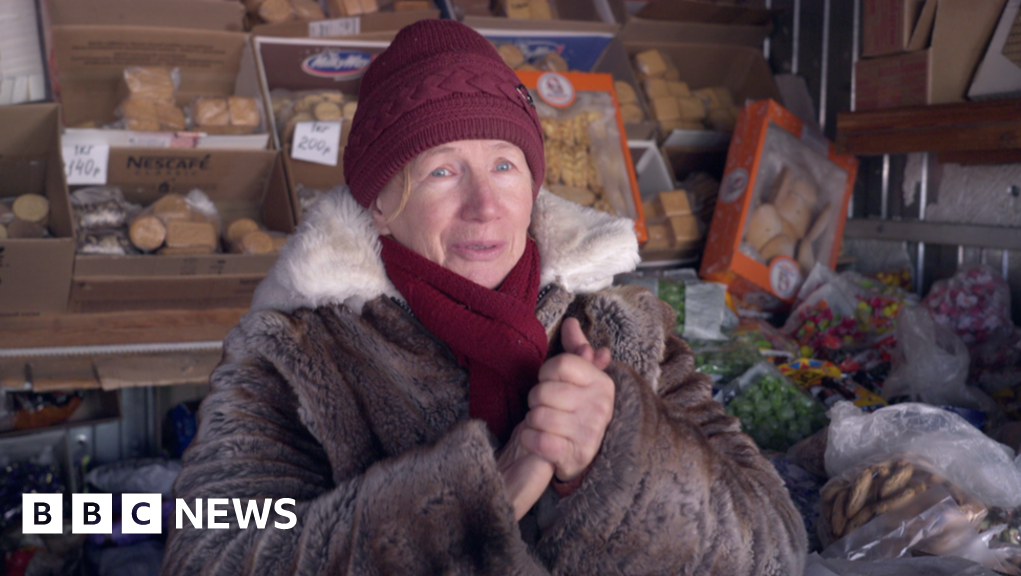The sounds of war are becoming routine at this market a few miles inside Russia’s border with Ukraine. I hear explosions in the distance. But no-one flinches.
Just metres away other stalls have been reduced to twisted metal. They were hit by a mortar a few days before.
At the time the market was shut, so no-one was hurt. But many stalls remain closed and there’s only a handful of customers. Sandbags are stacked up outside some of the buildings.
In many parts of Russia this feels like a virtual war: a conflict being played out on television, far from home. But in Russia’s Belgorod region war feels very real and very close.
Raisa Alexandrovna, who sells sweets here, has lost her sense of security.
“No-one’s protecting us,” Raisa tells me. “When people go home at night, they don’t know if they’ll still be in one piece in the morning.”
Everyone I speak to at the market tells me they live in fear of Ukrainian shelling. But they omit to mention that it was their country that invaded Ukraine.
They confirm that, one year, ago, life here was quiet and peaceful. Yet, they decline to join the dots and blame the Kremlin for what has transpired.
“We had to start this military operation,” Raisa insists. “It’s the right thing. We just should have been better prepared for it. We should have drafted people into the army right away. So many of our young men are dying. There’ll be no one left for our women to marry.”
“But what about the Ukrainians who’ve been killed because of Russia’s invasion?” I ask.
“Yes, people on both sides have been killed,” replies Raisa. “But the minds of Ukrainians have been altered. A new generation has grown up there hating Russians. We need to re-educate them. Re-make them.”
In the city of Belgorod, the regional capital, a giant letter ‘Z’ – the symbol of Russia’s military operation – has been erected along a busy highway. In recent months there have been explosions, too, in Belgorod, including at the airport, an oil depot and an apparent strike on a power plant. Suddenly residents are having to think about where to take cover. Shelters have been opened in cellars and in basements of apartment blocks.
Conversations here run similar to those at the market, with most people telling me: yes, security only became a problem after the invasion, but, no, they don’t blame the invasion itself. It’s as if there’s a psychological firewall preventing people from connecting the deteriorating security situation to the decision of their president.
If there is a firewall, patriotic messaging feeds it.
Staring down from billboards and advertising hoardings in Belgorod are the portraits of decorated Russian soldiers who’ve been fighting in Ukraine. The images and slogans encourage the public to rally round the flag.
“Thank you for your heroic deeds!” reads one poster.
“For the Motherland!” declares another.
“Everything for the front line! Everything for victory!”
“Believe in Yourself, but Live for Russia!”
In addition to the slogans on the street, there’s also the propaganda on Russian state TV. From morning till night news bulletins and talk shows assure viewers that Russia is in the right; that Ukraine and the West are the aggressors and that in this conflict the very future of Russia is at stake.
The messaging works.
In a Belgorod knitting shop, I get chatting to the owner. He clearly believes that, by criticising Russia, the West is pulling the wool over everyone’s eyes.
“The West plays a negative role,” he tells me. “It obviously wants to destroy Russia. We’ve seen that before. Under Adolf Hitler.”
Outside the shop, law student Ksenya agrees.
“Ukraine is a Western puppet,” Ksenya says, “and the West has always wanted to destroy Russia. Hitler wanted to grab our land. Who doesn’t? We have such an enormous country.”
Not everyone shares that view but few are willing to admit it in public.
“I don’t believe I can influence the situation,” says Ivan, further up the street. “I understand which country I’m living in and what the authorities have done to prevent ordinary people from expressing their opinions. Any such expression is dangerous.”
References to Hitler are not accidental. You hear them all the time on Russian TV. To spark patriotic fervour and boost public support for the “special military operation,” the Kremlin paints the war in Ukraine in similar colours as World War Two: as Russia fighting fascism, battling to defend the Motherland from foreign invaders.
The reality is very different. In 1941 Nazi Germany invaded the Soviet Union. In 2022 Vladimir Putin’s Russia launched a full-scale invasion of Ukraine.
In wasteland outside Belgorod I see first-hand how connections to World War Two are being created. A group of armed men have agreed to meet me. They call themselves “Smersh” (“Death to Spies”) after a notorious counter-intelligence unit created by Joseph Stalin in World War Two. They will not reveal their faces – or their names – but will talk briefly about their activities.
“At the moment we are training a territorial defence force for Belgorod region,” one man says. “Some of those in training have experience in fighting. Some are former police and ex-military. They will defend Belgorod region if there is an attack on Russia. As for us, we will carry out any task the commander-in-chief may give us, in any town, anywhere in the world.”
Among the men being trained is Evgeny Bakalo, a local writer and businessman. In Belgorod Evgeny has set up a support group for Ukrainians who’ve crossed into Russia to escape the war. Mr Bakalo’s opinion of Ukraine chimes with the controversial views of President Putin.
“We’re one people,” he tells me. “Ukrainians are Russians. They’ve just forgotten about it.”
A year of war and fierce Ukrainian resistance suggest the opposite: that now, more than at any other time in its post-Soviet history, the Ukrainian people value their sovereignty and independence and are determined not to be forced back into Moscow’s orbit.
Meanwhile, Moscow continues to portray Ukrainian officials as neo-Nazis and Western governments as Nazi sympathisers: another reason for the Kremlin’s frequent references to the 1940s.
Under President Putin, the national idea is constructed around World War Two – what most Russians refer to as the Great Patriotic War: both the Soviet Union’s victory in that war, and the enormous human cost of that victory. It is a hugely emotive subject.
Olga, who runs a church choir in Belgorod, tells me she is “very frightened” when the city is being shelled. When I suggest to her that this wouldn’t be happening if the “special military operation” hadn’t started, her immediate reaction is to reference World War Two.
“I return us to the Great Patriotic War,” Olga tells me, “which was a time of great sacrifice. There are always sacrifices being made. When our men go off to fight they know they may be killed.”
Olga’s husband isn’t at home. He’s volunteered to fight in the “special military operation”. She accepts the official view – the version of events that much of the world dismisses as the Kremlin’s alternative reality.
“Russia didn’t provoke this war,” Olga tells me. “A Russian will give you the shirt off his back. Russia didn’t attack Ukraine. Russians are peace-loving and generous.”
Produced by Will Vernon
Borrowed time for Bakhmut as Russians close in
Russian army officer: Our troops tortured Ukrainians
Five ways Ukraine war could go in 2023









